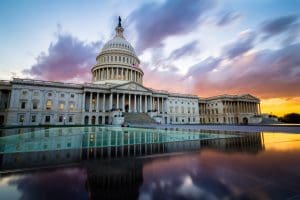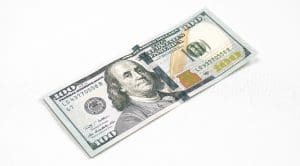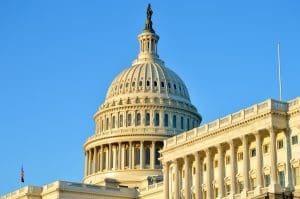The economic crisis caused by the coronavirus pandemic poses a triple challenge for tax policy in the United States. Lawmakers are tasked with crafting a policy response that will accelerate the economic recovery, reduce the mounting deficit, and protect the most vulnerable.
To assist lawmakers in navigating the challenge, and to help the American public understand the tax changes being proposed, the Tax Foundation’s Center for Federal Tax Policy modeled how 70 potential changes to the tax code would affect the U.S. economy, distribution of the tax burden, and federal revenue.
In tax policy there is an ever-present trade-off among how much revenue a tax will raise, who bears the burden of a tax, and what impact a tax will have on economic growth. Armed with the information in our new book, Options for Reforming America’s Tax Code 2.0, policymakers can debate the relative merits and trade-offs of each option to improve the tax code in a post-pandemic world.

Movers and Shakers in the International Tax Competitiveness Index
The Index provides lessons for policymakers when they are thinking of ways to remove distortions from their tax systems and remain competitive against their peers. The further up a country moves on the Index, the more likely it is to have broader tax bases, relatively lower rates, and policies that are less distortionary to individual or business decisions. Going the other way reveals a policy preference for narrow tax bases, special tax policy tools, and rules that make it difficult for compliance.
5 min read
Proposal for Reporting Requirements for Financial Institutions Misses the Mark
Reducing the tax gap is a good idea, but the reporting requirements for financial institutions could be better-targeted at the problem at hand.
4 min read
What’s Going on with the Child Tax Credit Debate?
President Biden expanded and fundamentally changed the Child Tax Credit (CTC) for one year in the American Rescue Plan (ARP) passed in March 2021. Policymakers are now deciding the future of the expansion as part of the proposed reconciliation package, but a wide range of estimates for the effects of a permanent expansion is confusing the debate.
7 min read
As Inflation Rises, So Will Tax Bills in Many States
Inflation is often called a hidden tax, but in many states it yields a far more literal tax increase as tax brackets fail to adjust for changes in consumer purchasing power.
5 min read
Reviewing How TCJA Impacted Mortgage Interest and State and Local Tax Deductions
Two major provisions in the federal tax code have been limited since the Tax Cuts and Jobs Act (TCJA) of 2017: the state and local tax (SALT) deduction and the home mortgage interest deduction (MID).
3 min read
Higher Taxes Under House Ways and Means Plan Emphasize Need for Corporate Integration
Under the House Ways and Means plan to raise taxes on corporations and individuals, the integrated tax rate on corporate income would rise to the third highest in the OECD. To reduce this burden, policymakers could explore integrating the individual and corporate tax systems.
8 min read
Corporate Tax Revenue Hit an All-Time High in 2021
This year’s robust corporate tax collections calls into question efforts by the administration and congressional Democrats to increase the corporate tax rate and raise other corporate taxes based on claims of relatively low tax collections following the Tax Cuts and Jobs Act (TCJA) in 2017.
2 min read
Should Tax Policy Play a Role in Tobacco Harm Reduction?
In an effort to raise roughly $100 billion, the House proposal would double cigarette taxes and increase all other tobacco and nicotine taxes to comparable rates—a strategy with severe unintended consequences.
5 min read
How Would the Ways and Means Proposal Affect Profit Shifting?
If Congress wants to reduce profit shifting, the proposal from the Ways and Means Committee is not an effective tool for this.
7 min read
Regional Tax Competition Is Stopping Spain from Becoming Europe’s Tax Hell
Tax competition has proven to be key in keeping tax hikes under control in some regions of Spain as regional governments look to copy Madrid’s tax reforms.
6 min read